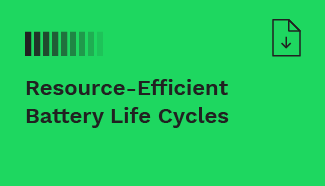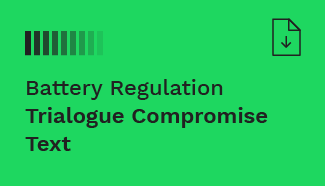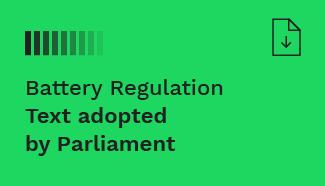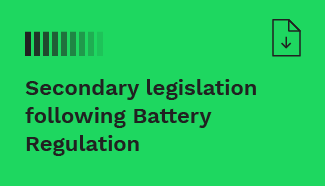
materials

Interested in further details?
Read through our selection of publications and reports around the Battery Passport
publications

Value Assessment
Unlocking the Value of the EU Battery Passport
This document establishes a qualitative and quantitative analysis of the battery passport’s economic, environmental, and social benefits across the value chain. It also describes challenges that stakeholders are likely to face when creating, maintaining, or using the battery passport and provides actionable recommendations for businesses and policymakers to maximise the strategic potential of the EU Battery Passport.
Battery Passport Content Guidance
Achieving compliance with the EU Battery Regulation and increasing sustainability and circularity.
Main Content Guidance
Data Conformity Assessment
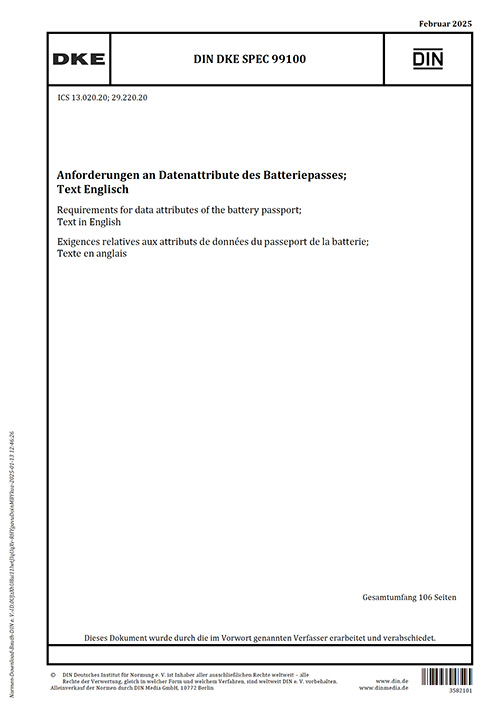
DIN DKE SPEC 99100
The new standard, DIN DKE SPEC 99100, defines data attributes to be included in the digital battery passport based on both requirements by the EU Battery Regulation as well as voluntary additions. Published in January 2025, it was developed by the Battery Pass consortium in cooperation with public industry consultation and builds on the “Content Guidance for the EU Battery Passport“.
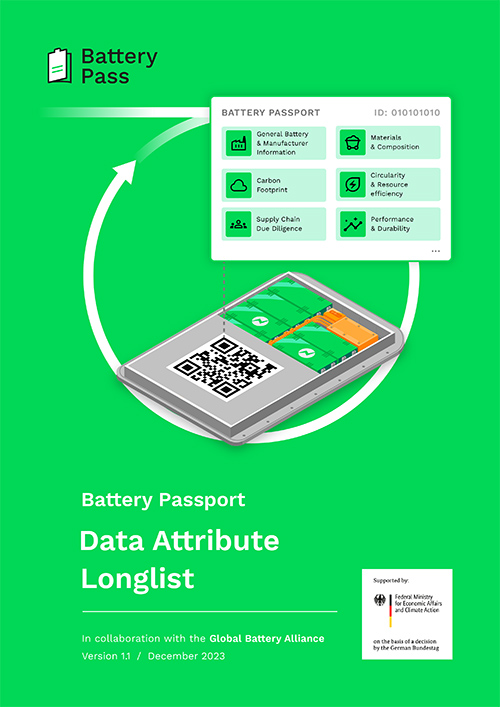
Data Attribute Longlist
The data attribute longlist aligns with the DIN DKE SPEC 99100 standard published in January 2025 and includes all data attributes required (and suggested) for the EU battery passport alongside definitions and further relevant data dimensions. It can serve as a first basis for and facilitates the technical demonstration and implementation of the EU battery passport within the own organisation.
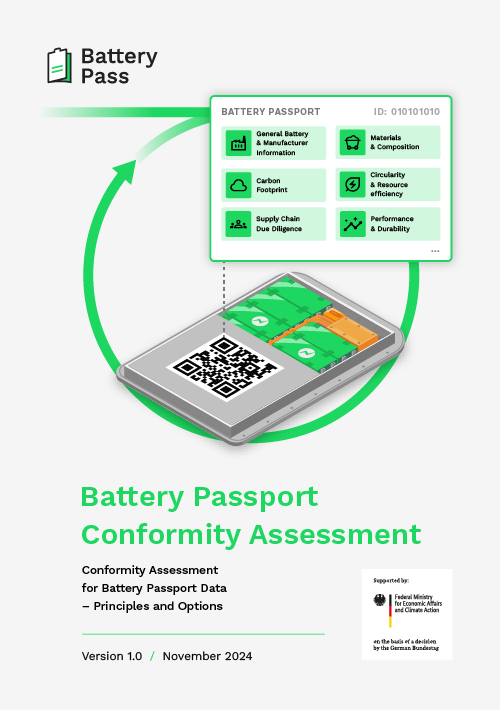
Data Conformity
This document provides a comprehensive overview of the principles and options for conformity assessment of battery passport data, emphasising the critical role of trustworthy data in supporting a circular economy. It expands beyond regulation, addressing specific challenges of the battery passport data and outlining practical recommendations.
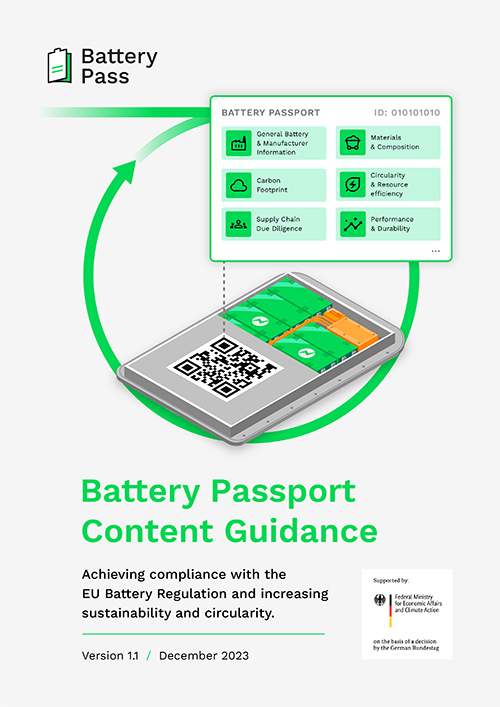
Main Content Guidance
From January 2025, a new standard, DIN DKE SPEC 99100, defines the “Requirements for Data Attributes of the Battery Passport”. Developed by the Battery Pass consortium in cooperation with public industry consultation, this builds on the Battery Pass Content Guidance, which was last updated in December 2023 and provided the first publicly available practical explanation of the content requirements of the battery passport as per the EU Battery Regulation.
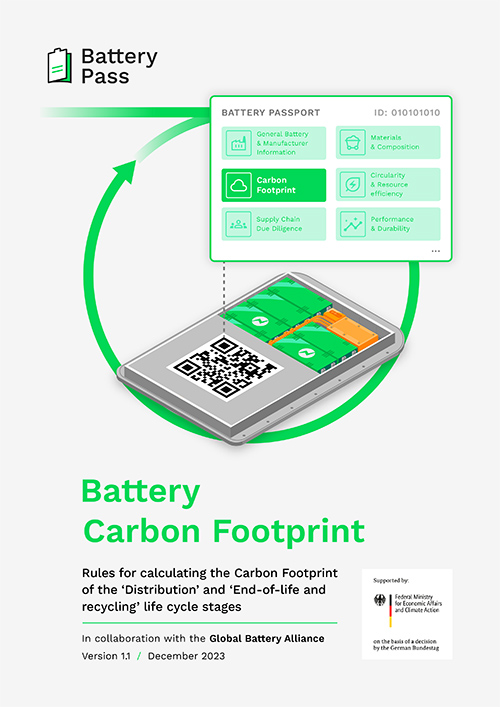
Carbon Footprint Rules
This document provides accounting rules to calculate company-specific carbon footprints of the battery ‘Distribution’ and ‘End-of-life and recycling’ life cycle stages. The rules are proposed as a complementation to the GBA GHG Rulebook, thus providing a cradle-to-grave Battery Carbon Footprint Rulebook.
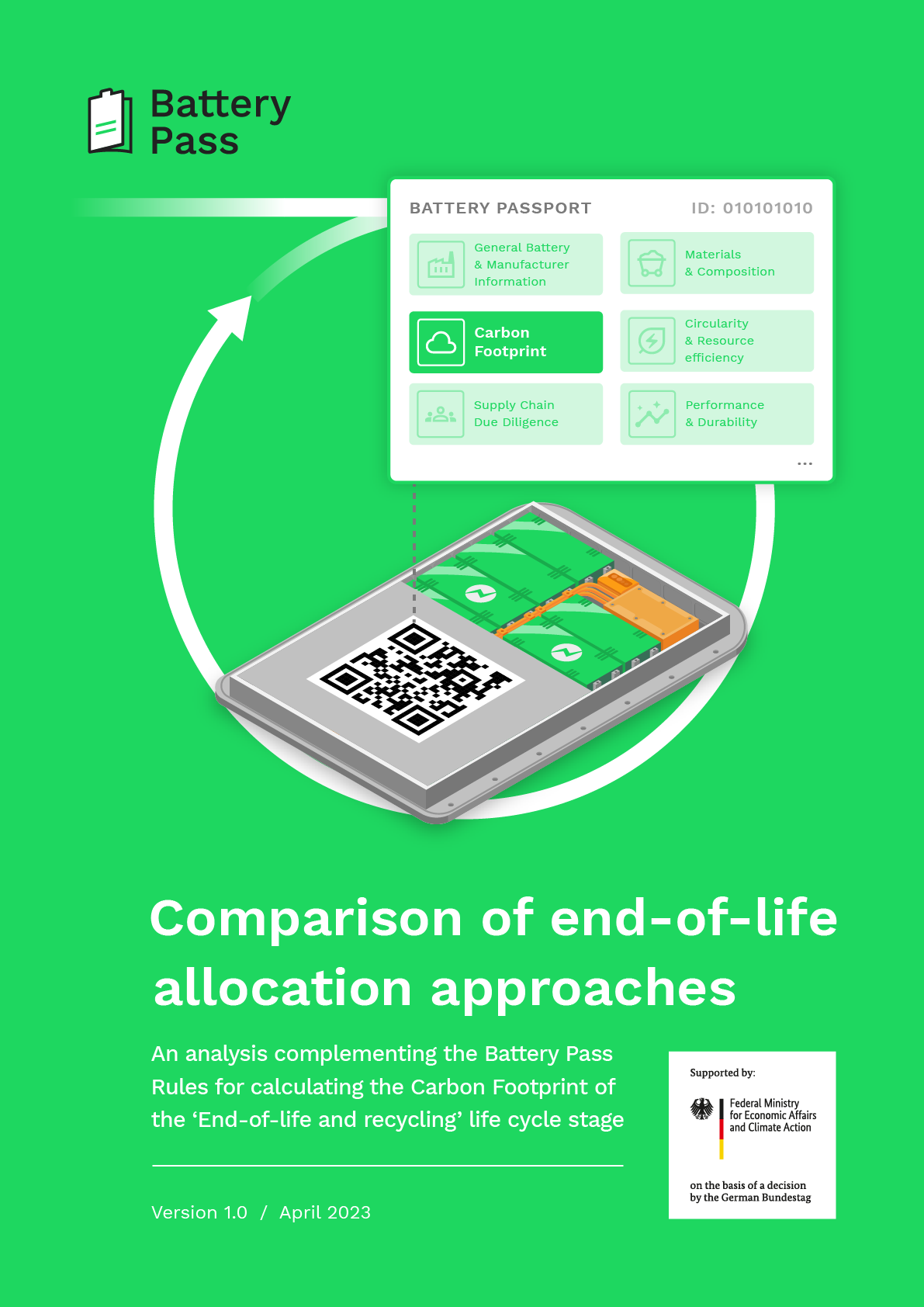
EOL Allocation Analysis
This insights report highlights the impact of the methodological choice on the carbon footprint declaration. It includes a comparative assessment of the three main end-of-life allocation approaches and their implications on the carbon footprint in the context of the EU Battery Regulation.
Battery Passport Content Guidance
Achieving compliance with the EU Battery Regulation and increasing sustainability and circularity.
Main Content Guidance
DIN DKE SPEC 99100
The new standard, DIN DKE SPEC 99100, defines data attributes to be included in the digital battery passport based on both requirements by the EU Battery Regulation as well as voluntary additions. Published in January 2025, it was developed by the Battery Pass consortium in cooperation with public industry consultation and builds on the “Content Guidance for the EU Battery Passport“.
Data Attribute Longlist
The data attribute longlist aligns with the DIN DKE SPEC 99100 standard published in January 2025 and includes all data attributes required (and suggested) for the EU battery passport alongside definitions and further relevant data dimensions. It can serve as a first basis for and facilitates the technical demonstration and implementation of the EU battery passport within the own organisation.
Data Conformity Assessment
Data Conformity
This document provides a comprehensive overview of the principles and options for conformity assessment of battery passport data, emphasising the critical role of trustworthy data in supporting a circular economy. It expands beyond regulation, addressing specific challenges of the battery passport data and outlining practical recommendations.
Main Content Guidance
Main Content Guidance
From January 2025, a new standard, DIN DKE SPEC 99100, defines the “Requirements for Data Attributes of the Battery Passport”. Developed by the Battery Pass consortium in cooperation with public industry consultation, this builds on the Battery Pass Content Guidance, which was last updated in December 2023 and provided the first publicly available practical explanation of the content requirements of the battery passport as per the EU Battery Regulation.
Carbon Footprint Rules
This document provides accounting rules to calculate company-specific carbon footprints of the battery ‘Distribution’ and ‘End-of-life and recycling’ life cycle stages. The rules are proposed as a complementation to the GBA GHG Rulebook, thus providing a cradle-to-grave Battery Carbon Footprint Rulebook.
EOL Allocation Analysis
This insights report highlights the impact of the methodological choice on the carbon footprint declaration. It includes a comparative assessment of the three main end-of-life allocation approaches and their implications on the carbon footprint in the context of the EU Battery Regulation.
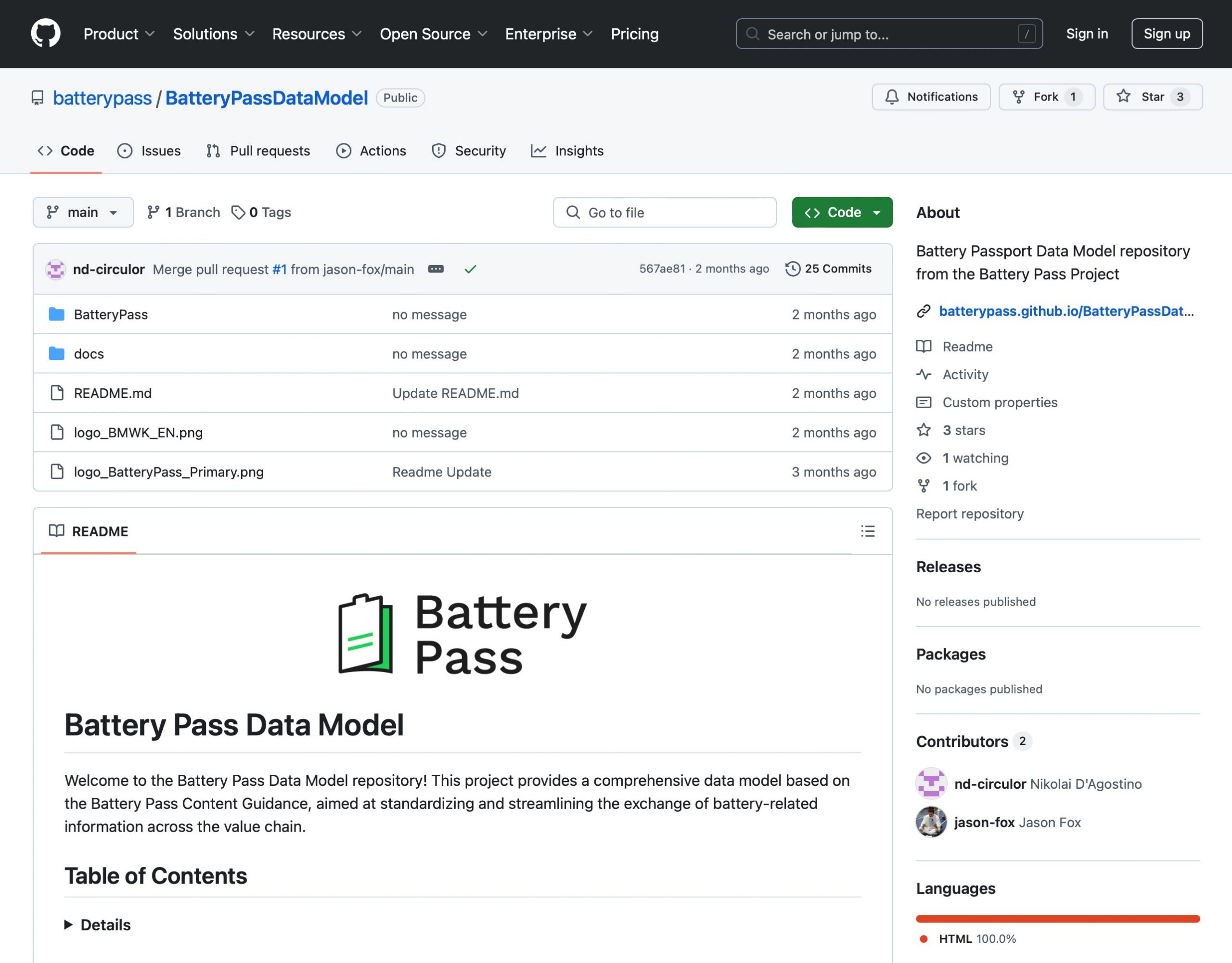
Data Model
Battery Passport Data Model on Github
This project provides a comprehensive data model based on the DIN DKE SPEC 99100:2025-02 “Requirements for data attributes of the battery passport“ , aimed at standardizing and streamlining the exchange of battery-related information across the value chain.
Technical Guidance and software demonstrator for the EU Battery Passport
Technical Guidance
Software Demonstrator
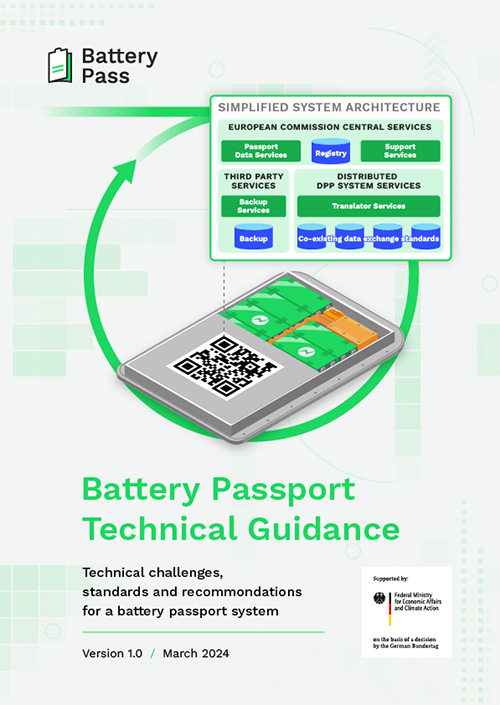
Technical Guidance
This document provides a comprehensive overview of the technical challenges and standards for the battery passport system. Critically, it also presents guidelines to help your organisation prepare for your participation in the battery passport ecosystem.
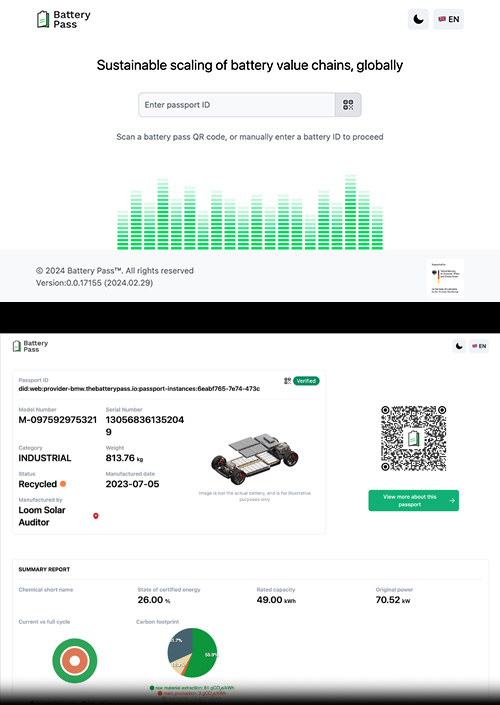
Software Demonstrator
The software demonstrator brings the concept of the battery passport through the entire lifecycle to life for the first time. It also tests the technical feasibility of a digital product passport system.
Technical Guidance and software demonstrator for the EU Battery Passport
Technical Guidance
This document provides a comprehensive overview of the technical challenges and standards for the battery passport system. Critically, it also presents guidelines to help your organisation prepare for your participation in the battery passport ecosystem.
Software Demonstrator
The software demonstrator brings the concept of the battery passport through the entire lifecycle to life for the first time. It also tests the technical feasibility of a digital product passport system.
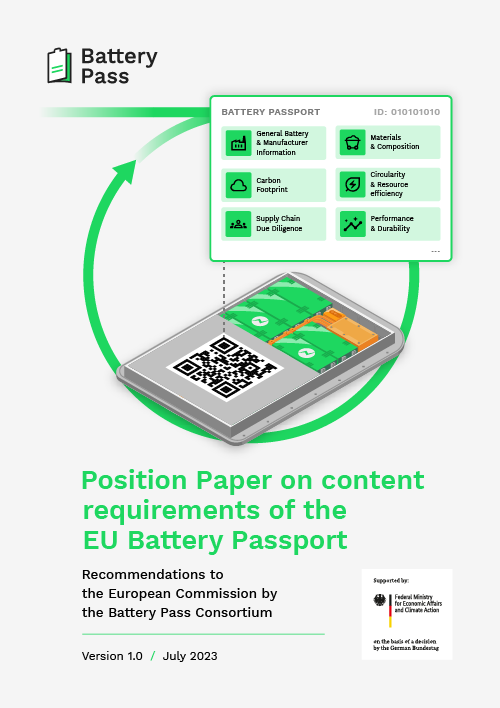
Position Paper
Content requirements of the EU Battery Passport
Recommendations to the European Commission by the Battery Pass Consortium
This document addresses clarification needs and presents recommendations by the Battery Pass consortium on battery passport content requirements as laid out in the EU Battery Regulation. It builds on our insights in the Battery Passport Content Guidance and is directed towards the European Commission incl. related institutions such as the JRC.
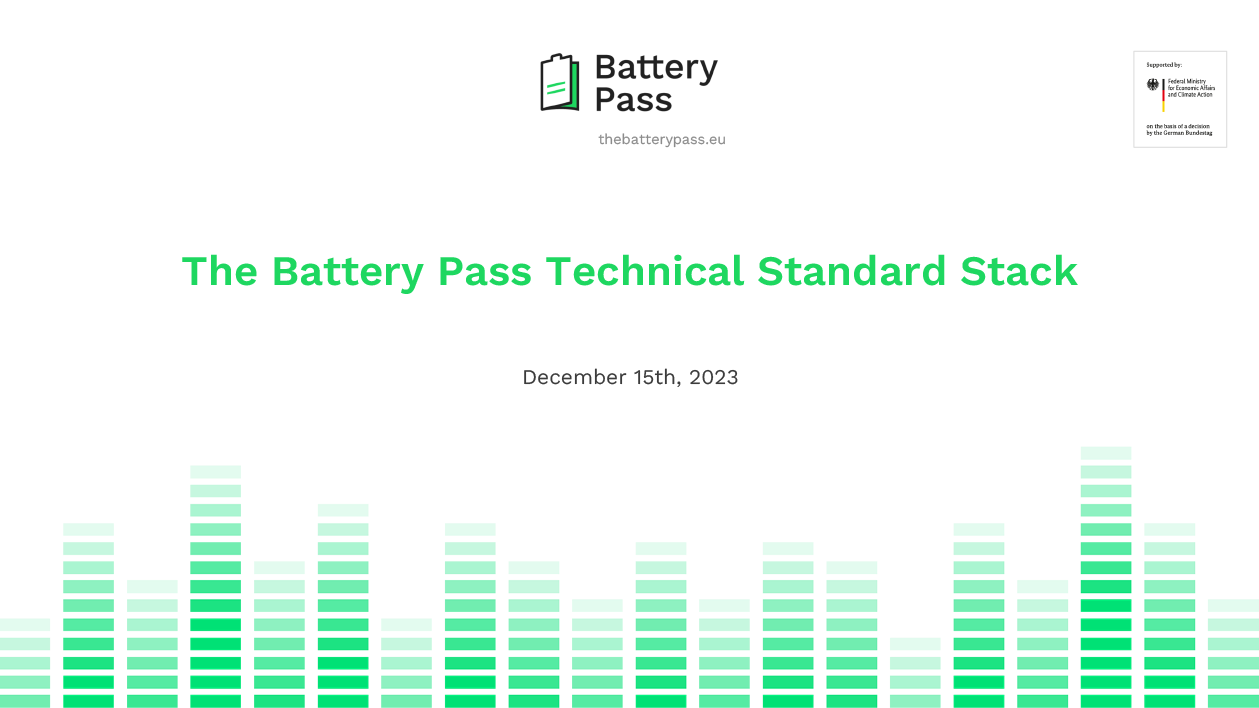
Technical Document
Technical Framework Specification for the Digital Product Passport System
A recommendation for standardisation of the European Digital Product Passport System (DPP-System) with particular specifics for the Battery Passport.
This document provides a comprehensive background architecture, called “Standard Stack”, which is essential to select, evaluate and elaborate standards for the technical DPP-System. It addresses the major interoperability issues and presents the elements of the Standard Stack, required for a secure, interoperable and reliable data exchange and provision across different sectors, e.g. for electrical vehicle batteries.
Communication materials


